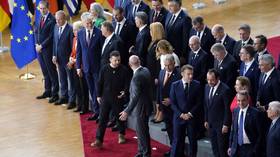Russian MP weighs in on ‘dogs-for-frontline’ call

The idea of relocating stray dogs to the front lines of the Ukraine conflict is “disrespectful and irresponsible,” the Russian State Duma’s first deputy chairman of the Committee on Ecology and Environmental Protection, Vladimir Burmatov, has said.
On Tuesday, a local MP in Yekaterinburg in Russia’s Urals, Artur Ziganshin, made headlines when he suggested that the city’s homeless animals could be sent to the front line. “We have a military operation underway. Maybe it’ll make sense to find use for the doggies there?” Ziganshin said during a meeting. The lawmaker justified his proposal by recalling that some 70,000 canines served in the Red Army during the Second World War.
Ziganshin's statement was “ill-considered,” Burmatov said in an interview with the media outlet Gazeta.ru on Wednesday.
The service dogs who are currently taking part in the Russian military operation “perform real feats. They give their own lives to save our guys or return [from the front line] in one piece because they are specially trained,” he explained.
The animals, which “had undergone extensive canine schooling,” are official members of the Russian military and security services, the MP said. A suggestion to “take all the mongrels and send them there [to the conflict zone] to be slaughtered is disrespectful and irresponsible,” he stressed.
Burmatov suggested that Ziganshin should travel to the conflict area and see for himself “how things work there.” Such a trip “would greatly enrich him spiritually and he would stop making such proposals,” he added.
By coming up with such a “harmful” initiative, the Yekaterinburg lawmaker has basically acknowledged that the problem of stray dogs is not being solved in his region, which means that “he is not doing his job too well,” Burmatov said.
“I believe that everyone should do their job: the service dogs [must] carry out their duties in the most difficult, important, hottest locations in the area of the military operation, and the lawmakers [must] do the things that the voters expected from them when they elected them to the legislature,” he stated.
According to Burmatov, Ziganshin should start dealing with the issue of homeless dogs by “adopting a canine from a shelter,” adding, “in this case there will be at least one less homeless animal.”
Articles in the local media suggest that stray dogs have recently become a pressing problem in Yekaterinburg, Russia’s fourth-largest city, with a population of approximately 1.5 million people. Only over the past week, there were reports of a woman with a child being attacked by dogs in the street and the residents of an apartment block being terrorized by a pack of aggressive strays.













